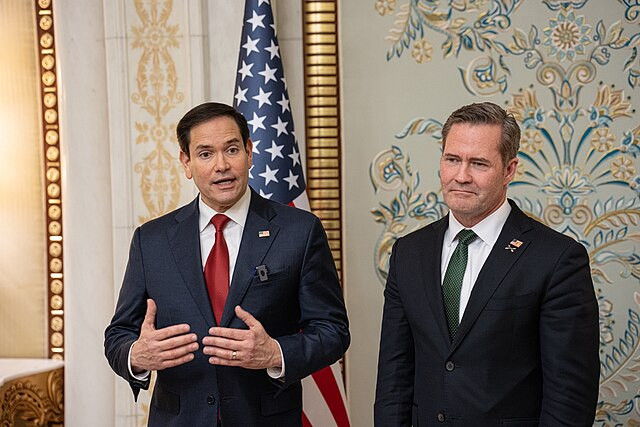Top officials in the Trump administration shared sensitive operational details regarding U.S. military strikes on Yemen through a Signal group chat, inadvertently adding a journalist to the discussion, according to reports confirmed by the White House. The revelation has raised alarm among former national security officials over the handling of classified information.
The Atlantic first reported that National Security Adviser Mike Waltz convened the Signal chat with Vice President JD Vance, Defense Secretary Pete Hegseth, Secretary of State Marco Rubio, CIA Director John Ratcliffe, and others to coordinate U.S. strikes on Houthi militants in Yemen. Waltz mistakenly added Jeffrey Goldberg, editor-in-chief of The Atlantic, to the group.
White House National Security Council spokesman Brian Hughes acknowledged the authenticity of the chat, stating, "At this time, the message thread that was reported appears to be authentic, and we are reviewing how an inadvertent number was added to the chain. The thread is a demonstration of the deep and thoughtful policy coordination between senior officials. The ongoing success of the Houthi operation demonstrates that there were no threats to our servicemembers or our national security."
The chat reportedly included "operational details of forthcoming strikes on Yemen, including information about targets, weapons the U.S. would be deploying, and attack sequencing," according to The Atlantic. Ratcliffe also shared "information that might be interpreted as related to actual and current intelligence operations."
Former Defense Secretary and CIA Director Leon Panetta reacted sharply to the disclosure. "Somebody needs to get fired," Panetta told CNN. "How the name of a journalist was added to that list - this is just a serious blunder," he said, warning that had it been another individual, sensitive information could have been relayed to Houthi forces, risking American lives.
The Pentagon explicitly prohibits using apps like Signal for transmitting non-public Department of Defense information. Pentagon rules state such apps "are NOT authorized to access, transmit, process non-public DoD information." Former Justice Department officials noted that similar behavior by lower-level staff would typically result in investigations, possible loss of clearances, or legal consequences.
A former senior U.S. defense official explained to CNN the process required to move information from secure systems to unclassified networks. "You can't forward a classified email to an unclassified system. You would either have to print it out or type it up while looking at both screens. So he had to have done it or somebody would've had to have done it for him that way."
President Donald Trump denied knowledge of the incident when asked by reporters Monday. "I don't know anything about it," Trump said. "It couldn't have been very effective, because the attack was very effective. I can tell you, I don't know anything about it. You're telling me about it for the first time."
In the chat, Vice President Vance expressed concerns about potential economic fallout and the timing of the operation. According to The Atlantic, Vance wrote, "I am not sure the president is aware how inconsistent this is with his message on Europe right now. There's a further risk that we see a moderate to severe spike in oil prices. I am willing to support the consensus of the team and keep these concerns to myself."
William Martin, communications director to the vice president, issued a statement saying, "The Vice President's first priority is always making sure that the President's advisers are adequately briefing him on the substance of their internal deliberations. Vice President Vance unequivocally supports this administration's foreign policy. The President and the Vice President have had subsequent conversations about this matter and are in complete agreement."
At the State Department, spokesperson Tammy Bruce declined to elaborate on Secretary Rubio's participation, stating, "We will not comment on the secretary's deliberative conversations, and secondly, that you should contact the White House."
Senator Jack Reed, the top Democrat on the Senate Armed Services Committee, called the incident "stunning and dangerous." In a statement, Reed said, "If true, this story represents one of the most egregious failures of operational security and common sense I have ever seen. Military operations need to be handled with utmost discretion, using approved, secure lines of communication, because American lives are on the line."
The Pentagon referred all questions to the White House. No formal investigation has been announced as of Monday evening.






